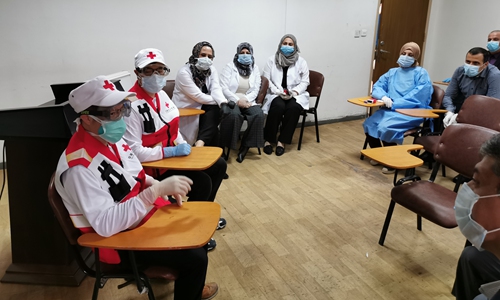Team from China builds test lab in Iraq to help fight coronavirus

The volunteer experts of the Red Cross Society of China communicate their experience of pandemic prevention with medical staff of Baghdad Medical City Hospital in Iraq. Photo: Courtesy of Tao Zhongquan
A seven-member Chinese medical team is going all out to help Iraq fight against the COVID-19 pandemic, advising the government to take stricter prevention measures, sharing China's treatment experience with their Iraqi counterparts and promoting pandemic control know-how among residents.
Iraq is in urgent need of nucleic acid test kits, team members told the Global Times. The dearth of test kits may have been the reason for fewer confirmed cases in the country, and therefore the Chinese experts are assisting Iraq in building a Polymerase Chain Reaction (PCR) laboratory in Baghdad and donated 50,000 nucleic acid test kits to improve its diagnostic capability.
At the request of the Iraqi Red Crescent Society, the Chinese volunteer medical team was dispatched by the Red Cross Society of China and arrived in Baghdad on March 9 with medical supplies.
China's top respiratory expert Zhong Nanshan, head of National Health Commission (NHC) high-level expert group, also closely connects with the volunteer experts to provide support for Iraq's COVID-19 fight.
Lacking detection
Iraq has 154 confirmed cases of COVID-19 with a death toll of 11, the Xinhua News Agency reported on Tuesday.
"The relatively small number of confirmed cases in Iraq is possibly because of its limited nucleic acid testing capabilities. No one knows for sure how many people have actually been infected here," Tao Zhongquan, leader of the Chinese experts' team, told the Global Times.
Iraq has previously completed around 700 sample tests using nucleic acid test kits donated by the World Health Organization (WHO), mainly for suspected cases with symptoms and new arrivals. Iraq lacks a true picture of how the pandemic is spreading given its limited capability for detection, according to Xinhua.
Officials from Iraqi Ministry of Health told the Chinese experts that they want to learn from China's experience to implement the strategy of early detection, early reporting, early isolation and early treatment. However, their financial capacity is limited, so they cannot afford so many tests and the prevention cost, according to Tao.
The Red Cross Society of China donated a set of laboratory equipment to Iraq, including two PCR machines and 50,000 nucleic acid test kits, which will help Iraq greatly improve its detection capability and control the local pandemic at an early stage, Tao noted.
The Chinese team is also assisting Baghdad Medical City Hospital to build a PCR laboratory and train their nucleic acid testers in order to expand local testing and improve Iraq's clinical diagnostic ability.
The laboratory is scheduled to be completed later this week, Tao said.
Doctor Zhong, who guides the frontline work by email, has called for the donation of medical equipment to Iraq, and believes that pandemic prevention work in Iraq should be carried out at the national level, Tao told the Global Times.
Two of the Chinese experts Xu Yonghao and Chen Huai, both from the First Affiliated Hospital of Guangzhou Medical University in South China's Guangdong Province are from the team of Zhong Nanshan.
Insufficient attention
After arriving in Baghdad, the Chinese experts met with officials from the Iraqi Ministry of Health, heads of some local hospitals and WHO officials in Iraq. They shared China's experience against COVID-19 with medical staff when visiting the Baghdad medical city hospital.
"Most Iraqis are not paying sufficient attention to the outbreak. Few people are wearing masks in public gathering events. Not even all the government officials we met wore masks," Tao told the Global Times.
Chinese experts advised the Iraqi government to strengthen border inspections, as many of its confirmed cases came from outside Iraq.
The country shares a border with Iran, which had 16,169 confirmed cases as of Tuesday, raising fears of an outbreak.
They advised the Iraqi government to establish a joint prevention and control mechanism against COVID-19.
It is also important for local governments to encourage religious leaders to participate in joint prevention and control mechanisms, Tao noted.
Chinese experts suggested the Iraqi government to increase its awareness of the outbreak, requiring masks to be worn at important meetings and public places.
The national COVID-19 prevention and control plan and clinical diagnostic guidelines should be introduced as soon as possible, Tao said.
In order to control the spread of COVID-19, the Iraqi government decided to impose a curfew in Baghdad from 11 pm on March 17 to 11 pm on March 23. Flights are suspended from Baghdad to and from Iraq's other provinces during March 17 to March 24. The Iraqi government gave their governors the power to impose curfews, according to Xinhua.
"Iraq suffers from an underdeveloped medical system and a great shortage of medical resources in the backdrop of decades-long US occupation and civil war.
Local hospitals have to set up a fever clinic and establish an isolation system for triage of common patients and suspected cases of COVID-19, Chinese experts told local health officials.
They also provided local medical staff with self-protection training. "It is important to prevent infections in hospitals and to protect the safety of medical staff," Tao noted.
The WHO acknowledged that the spread of COVID-19 in Iraq reached community transmission levels on March 9.
The Chinese expert team went to the local community to popularize the prevention and control measures among local people, advising them to wear masks, measure their temperatures, wash their hands frequently and have fewer parties.
Newspaper headline: Lending a hand